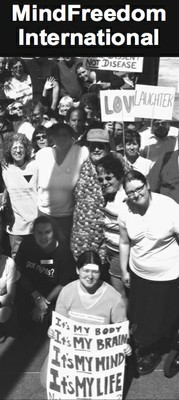MindFreedom believes in the dignity and VOICE of every human being, no matter how mentally or emotionally distressed. We — human beings — all have the right to CHOICE and true, informed consent in mental health care. Brutality in the name of forced psychiatric treatment “for our own good” is a horrific and deeply degrading practice that must end.

For years, the MindFreedom Shield Campaign has been using PEOPLE POWER to protect individuals from unwanted psychiatric interventions. Shield alerts have the potential to activate a network of thousands to raise a non-violent ruckus with the goal of stopping forced psychiatric interventions.
Look at Glen K. of New York, whose forced electroshock was stopped just 48 hours after his MindFreedom Shield was activated. Look at Elizabeth Ellis of Minnesota, who wrote at the completion of the MindFreedom Shield campaign to free her, “If it hadn’t been for MindFreedom I would still be getting forced shock. I know the hospital recognized they had a power to reckon with in MindFreedom. Thank you, thank you, thank you so much for the support!”
There are two keys to a successful Shield Campaign — PEOPLE POWER and RIGHTEOUSNESS. One or two emails or calls won’t make much of a difference to a mid-level mental health administrator or a staffer for a state legislator, but 500? 1000? And each writer and caller is passionately aware (often at the cost of difficult firsthand experiences) that forced psychiatric treatment is a human rights violation, that we ALL have a right to human dignity and bodily integrity.
MindFreedom is not alone in these beliefs; we stand in solidarity with the United Nations’ Special Rapporteur on Torture and Other Cruel, Inhuman or Degrading Treatment or Punishment, who stated recently that “free and informed consent should be safeguarded on an equal basis for all individuals without any exception… provisions allowing confinement or compulsory treatment in mental health settings must be repealed.”
Better still if they are never passed in the first place.
Texas HB 2212

We alert the mental health activism community to proposed Texas House Bill 2212 (full text here), which will dramatically expand the population eligible for assisted outpatient commitment in this state. In a blatant assault on the right to bodily integrity, the bill would allow psychiatric interventions including what the state says is “clinically necessary medication” to be administered by force to law-abiding citizens living in the their own homes based on a few, elastic criteria.
We’re calling on everyone – whether they live in the state of Texas or not – to alert Texas legislators and their staffers to the human rights violations this would entail. Write an email, place a phone call, send a letter… RAISE YOUR VOICE and tell them that forced outpatient commitment is:
– a human rights violation (according to the U.N.)
– ineffective at reducing hospital readmissions and improving clinical/social outcomes (according to the research of Oxford professor and former supporter of the intervention Tom Burns – he’s now calling for a moratorium on the practice)
– a traumatizing and dehumanizing ordeal, lasting months or years, and a profound deprivation of liberty for law-abiding citizens (according to this individual subjected to long term home-based forced psychiatric drugging and many other survivors)
Learn more about how you can get involved in this important effort HERE.
MindFreedom will be there to Shield its Texas members if this bill passes. But in the meantime you can make a difference in our campaign to shield every citizen in Texas from these invasive legal powers being added to forced psychiatry’s arsenal by voicing YOUR opposition to Texas legislators and their staffers.
MindFreedom is dedicated to fighting for the right of all people globally to be free from unwanted psychiatric labeling, drugging, and dehumanization. Will you join us in this important struggle?
It takes just a few minutes of your time to add your voice to the chorus of hundreds of human rights advocates who have already inundated the Texas state house with correspondence. But those few minutes of your life would help SHIELD many Texan lives from the threat of psychiatric force.















Here is an email just sent to the Texas lawmakers:
Dear Legislators,
i urge you not to pass the captioned bill. In addition to my JD degree, I have an LLM in Law, Psychiatry and Criminology from the George Washington National Law Center. I also have a masters degree in social work and am licensed to practice clinical social work in Maryland (LCSW-C). I have been an assistant professor of Criminal Justice, an Assistant State’s Attorney, the director of a Treatment Foster Care program, and have worked in a program that re-integrated former mental patients into their community.
Based on my 40 years of experience in the field, I do not believe forced outpatient drugging is effective; moreover, it is an intrusion on citizens’ bodies and basic freedoms. A recent article by a British psychiatrist ,who for 20 years had advocated for and helped design such programs, acknowledged that these measures do not work: Dr. Tom Burns, head of the social psychiatry department of the prestigious Oxford University, recently wrote this in Lancet, one of the world’s great medical journals regarding Britain’s Community Treatment Orders (“CTO’s”)
“The evidence is now strong that the use of CTOs does not confer early patient benefits despite substantial curtailment of individual freedoms. … Their current high usage should be urgently reviewed. I think there should be a moratorium on their use at least for a year or so while we think through how we can improve on the quality of evidence we’ve got. If we can’t do that I think it really is unjustified to continue to use them.”
Another unrecognized problem is that public safety can actually be compromised by forced outpatient drugging. The most common psychiatric drugs – SSRI’s and other antidepressants – carry “black box warnings” (the most urgent warnings given by the FDA) that these drugs pose a serious danger of increased suicidality. These drugs also carry FDA warnings of increased agitation, anxiety and aggression. The “antipsychotic” drugs carry similar warnings about agitation, suicidality and violence. It is not at all clear that forcing outpatients to take these drugs will increase safety for either patients or the public.
A large number of mass shooters in the U.S. have been involved in the mental health system, and have had therapeutic doses of antidepressants or other psychiatric drugs in their systems at the time of their crimes. Given that the FDA has warned of increased risk of these types of actions while on these drugs, there has been a stunning lack of public concern over whether these drugs actually make such tragedies more likely. Some crimes may be avoided by the use of psychiatric drugs, but quite possibly many other crimes occur because of the same drugs.
Under these circumstances, and particularly with freedom as the foundation of our country, I urge you not to approve House Bill 2212.
Sincerely,
Peter C. Dwyer, JD, LLM, MSW, LCSW-C
Report comment
Here is an email I just sent to the Texas lawmakers:
Dear Legislators,
i urge you not to pass the captioned bill. In addition to my JD degree, I have an LLM in Law, Psychiatry and Criminology from the George Washington National Law Center. I also have a masters degree in social work and am licensed to practice clinical social work in Maryland (LCSW-C). I have been an assistant professor of Criminal Justice, an Assistant State’s Attorney, the director of a Treatment Foster Care program, and have worked in a program that re-integrated former mental patients into their community.
Based on my 40 years of experience in the field, I do not believe forced outpatient drugging is effective; moreover, it is an intrusion on citizens’ bodies and basic freedoms. A recent article by a British psychiatrist ,who for 20 years had advocated for and helped design such programs, acknowledged that these measures do not work: Dr. Tom Burns, head of the social psychiatry department of the prestigious Oxford University, recently wrote this in Lancet, one of the world’s great medical journals regarding Britain’s Community Treatment Orders (“CTO’s”)
“The evidence is now strong that the use of CTOs does not confer early patient benefits despite substantial curtailment of individual freedoms. … Their current high usage should be urgently reviewed. I think there should be a moratorium on their use at least for a year or so while we think through how we can improve on the quality of evidence we’ve got. If we can’t do that I think it really is unjustified to continue to use them.”
Another unrecognized problem is that public safety can actually be compromised by forced outpatient drugging. The most common psychiatric drugs – SSRI’s and other antidepressants – carry “black box warnings” (the most urgent warnings given by the FDA) that these drugs pose a serious danger of increased suicidality. These drugs also carry FDA warnings of increased agitation, anxiety and aggression. The “antipsychotic” drugs carry similar warnings about agitation, suicidality and violence. It is not at all clear that forcing outpatients to take these drugs will increase safety for either patients or the public.
A large number of mass shooters in the U.S. have been involved in the mental health system, and have had therapeutic doses of antidepressants or other psychiatric drugs in their systems at the time of their crimes. Given that the FDA has warned of increased risk of these types of actions while on these drugs, there has been a stunning lack of public concern over whether these drugs actually make such tragedies more likely. Some crimes may be avoided by the use of psychiatric drugs, but quite possibly many other crimes occur because of the same drugs.
Under these circumstances, and particularly with freedom as the foundation of our country, I urge you not to approve House Bill 2212.
Sincerely,
Peter C. Dwyer, JD, LLM, MSW, LCSW-C
Report comment
Sorry for the duplicate – it didn’t seem to go through, I re-sent, then they both showed up.
Report comment
Really hope UK evidence helps in the fight against this
Report comment
Thank you so much for posting this.
Duane
Report comment
This article discusses MindFreedom’s Shield Campaign. Is it really best to associate opposition to harmful treatments with running from the law? There’s a strong case that people who want to work reasonably with the law on fair terms oppose harmful treatments, because of their unhealthy effects on so many people, everyone in their lives, and society in general. I commented more on MIA’s facebook page.
Report comment
The MindFreedom Shield program is unequivocally NOT about ‘running from the law’. The advocacy done by MindFreedom members when one member activates their Shield involves nonviolent and completely legal methods of lobbying such as highlighting the targeted person’s plight in the media, with local politicians, and letting mental health system administrators know that sunlight is being shone on their activities.
MindFreedom does not advocate or facilitate any illegal activity.
We hope this has clarified the situation for you. If you have any questions about MindFreedom programs you are encouraged to contact our office directly, and we will be happy to share more information with you. We would rather those who are unclear on the facts do this than make sweeping public and permanent statements online.
Report comment
oops, my reply is below
Report comment
Shining a light on the whole truth through public advocacy can be very healthy. Recognizing the credibility of people’s statements is vital to social health and justice. The MindFreedom Shield Campaign page gives an example of crossing state lines to escape forced drugging.
As freedom of mind is enabled by appreciating a diversity of mindsets, how many people might have different perspectives on what they’d call crossing state lines to avoid court orders? Could that make someone’s case more of a federal concern, especially in some people’s eyes? Could that be beneficial? After all, the NIMH is working for greater validity than the DSM has provided.
People who enjoy freedom of mind often enjoy considering different perspectives. They might even advocate for their value. After all, modeling appreciation for diverse perspectives is healthy for people’s minds. Clarifying the whole truth about people’s social environment can be healthy (rather than disorienting them by distorting their perceptions).
Report comment
Re: Texas HB 2212
House bills need to come out of committee here in Texas by May 9th. Per house rep, this bill is not going to see the light of day.
Thanks to everyone who took the time to write/call the reps listed.
Best,
Duane
Report comment
And thanks to my friend John Breeding, who fights the good fight here in Texas, especially for children!
Duane
Report comment